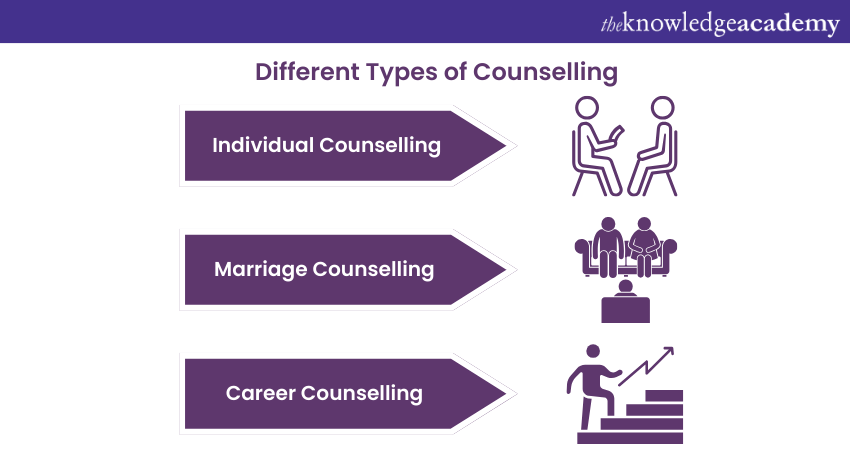Top Reasons Couples Choose couples counselling to Thrive
A Comprehensive Guide to the Numerous Sorts Of Counselling and Their Impact
Counseling encompasses a variety of restorative techniques, each created to satisfy special psychological health and wellness requirements. From the structured methods of Cognitive-Behavioral Therapy to the compassionate nature of Person-Centered Therapy, these modalities offer distinct paths to personal development. Family members treatment and Dialectical Habits Therapy offer added frameworks for healing, while team counseling fosters neighborhood support. Recognizing these diverse methods can illuminate their profound influence on individual health. What stays to be checked out are the complexities of each approach.

Recognizing Cognitive-Behavioral Therapy (CBT)
Although numerous therapeutic techniques exist, Cognitive-Behavioral Therapy (CBT) stands apart as a result of its organized, ambitious nature. This kind of therapy is based upon the premise that thoughts, sensations, and behaviors are interconnected, and by transforming negative thought patterns, people can alter their emotional actions and activities. CBT employs different strategies, such as cognitive restructuring, which helps clients recognize and test distorted beliefs. Behavior activation encourages engagement in pleasurable tasks to deal with anxiety.
Normally, CBT is a temporary treatment, typically long lasting between 12 to 20 sessions, making it available for those seeking quick outcomes. Its efficiency has been well-documented in treating anxiety problems, depression, and other mental wellness problems. The therapist's role is to lead customers with exercises and research projects, promoting self-awareness and advertising long-lasting coping approaches. This useful technique empowers individuals to take control of their mental well-being, ultimately resulting in improved life fulfillment.
Checking Out Person-Centered Therapy
Person-Centered Therapy, established by Carl Rogers, provides a contrasting technique to Cognitive-Behavioral Treatment by highlighting the client's subjective experience. This restorative model prioritizes the person's perspective, promoting an environment of compassion, unconditional favorable regard, and credibility. By allowing customers to explore their sensations and ideas without judgment, therapists promote personal development and self-discovery.
The core tenet of Person-Centered Treatment is the belief that people possess the intrinsic capacity for self-healing and personal growth. In this setup, the specialist functions as an encouraging guide instead of an instruction authority, urging clients to organize their very own journey. This technique is especially efficient for those facing issues such as reduced self-worth, anxiety, or anxiety, as it encourages them to challenge and comprehend their feelings. Ultimately, Person-Centered Therapy grows a solid therapeutic partnership, fostering count on and visibility essential for significant modification.
The Duty of Family Members Therapy in Recovery
Family therapy functions as an essential element in the recovery procedure for people and their partnerships. This healing approach concentrates on improving communication, solving problems, and promoting deeper links among member of the family. By resolving dysfunctional characteristics, family therapy urges each participant to reveal their thoughts and feelings in a secure atmosphere, promoting understanding and empathy.

The effect of family members therapy extends beyond the sessions, as enhanced connections can cause boosted psychological health for all entailed. Overall, family therapy plays a vital role in healing by fostering unity, resilience, and common assistance among member of the family, eventually leading them toward a much healthier, more satisfying life with each other.
Unpacking Dialectical Behavior Modification (DBT)
Building on the structure of therapeutic methods that website boost emotional wellness, Dialectical Behavior modification (DBT) offers a structured structure for people battling with intense emotions and behavior obstacles. Developed by Marsha Linehan, DBT integrates cognitive-behavioral methods with mindfulness techniques, intending to help clients handle frustrating feelings and boost social efficiency.
The therapy is particularly valuable for those identified with Borderline Personality Problem however is also relevant to a variety of other psychological wellness problems. couples counselling. DBT includes private treatment sessions and abilities training groups, concentrating on four vital capability: mindfulness, distress resistance, emotion law, and interpersonal performance
The Benefits of Group Counselling Sessions
While private treatment supplies beneficial insights, team therapy sessions use special advantages that can significantly improve the healing experience. One vital benefit is the sense of neighborhood that arises among individuals. Individuals usually discover convenience in sharing their experiences with others facing comparable challenges, promoting an encouraging environment that minimizes feelings of isolation.
Group sessions urge varied perspectives, allowing individuals to find out from each other's coping approaches and insights. This collective wisdom can lead to boosted analytic capabilities and a more comprehensive understanding of personal problems.
Additionally, team therapy usually advertises liability, as members inspire one an additional to seek their goals and follow their commitments. Ultimately, the cost-effectiveness of team treatment makes it an available alternative for many individuals seeking support. In general, the joint nature of team counseling sessions can considerably enhance the therapeutic journey.
Often Asked Questions
What Certifications Do Therapists Required to Practice Counseling?
Specialists usually need a pertinent degree in psychology or counseling, in addition to monitored medical experience. Furthermore, they need to obtain ideal licensure or accreditation to exercise lawfully, guaranteeing adherence to professional criteria and moral guidelines.
Exactly how Do I Select the Right Type of Treatment for Me?
Selecting the best type of treatment includes evaluating individual requirements, exploring different techniques, taking into consideration specialist specializeds, and looking for referrals. Understanding private objectives and preferences can significantly improve the efficiency and fulfillment of the healing experience.
Are Online Counseling Sessions as Effective as In-Person Ones?
The efficiency of on the internet therapy sessions contrasted to in-person ones commonly relies on individual preferences and situations. Research study suggests that both techniques can generate favorable end results, though some might find better comfort in face-to-face communications.
For How Long Does Counseling Typically Last?

What Should I Expect Throughout My First Counseling Session?
Throughout the very first therapy session, customers can expect an introduction, conversation of their concerns, establishment of objectives, and a review of the counseling process - adhd counselling. This first meeting aims to develop relationship and warranty convenience